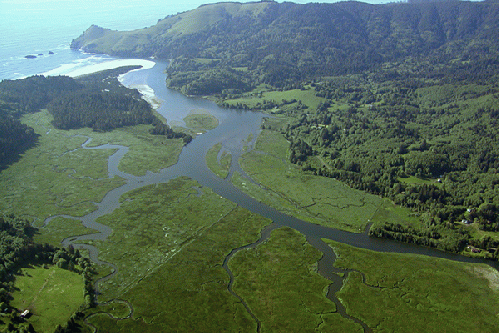There is no greater failure than the failure to respond to this ecological crisis. We need a wartime-speed mobilization and a just transition to race to zero greenhouse gas emission and to take carbon out of the atmosphere in order to restore a safe climate. We are called to heroism in this hour of grave consequences. We still have an opportunity to fight for all humanity and all life on Earth to avert the worst of the disaster as it is still technically and economically possible.
- Bill Kucha, founder of 350 Oregon Central Coast
Sometimes being a journalist and fiction writer puts me in a compelling world of everyone else's narratives and predicaments. Small towns, flyover states, even countries like Mexico and Vietnam where the average Western reader holds some bizarre beliefs about the places and the people. The universal truths, though, abound, especially in small towns. I have a deep well of respect for people I just meet but get to know deftly, and this idea that small towns have small town thinkers is balderdash.
These people I meet on my journey keep me going on, even though I know we are cooked as a society (planet), as well as all modern cultures, because of the convalescing power of 7.8 billion people on earth ravaging, pillaging and trashing the planet in a race for more, more, more incubated in and encouraged by the insanity of religions and economic systems that have cemented the me-myself-and-I egocentricity into each generation, here and now and into those yet born.
I'm in Otis, Oregon, a spit of a town near Lincoln City in the county of the same name, along the Central Coast of Oregon, a most gorgeous and biodynamic place. So breathtaking that these towns of Newport, Depoe Bay, Yachats and Lincoln City are magnets for those dreaded invasives called California Erectus.
Last week (January 14-19) I ended up at a nighttime lecture series at a small community college, Oregon Coast CC, for a lecture by two divergent characters, Bill Kucha, an artist and environmental activist strumming his folk guitar and slide-projecting some of his canvas art, and then first with Evan Hayduk, restoration specialist with the Midcoast Watersheds Council.
Hayduk had his Power Point all warmed up to tell the 50-plus attendees the challenges to this central coast with inundation from melting waters caused by global warming. This lecture was wonky and science driven, a good way to contrast a science team's work through the auspices of a non-profit environmental group, and the work of the artist, Bill, who had been a teacher at the small community college since 1976.
The entire suite of issues surrounding the impacts of climate change/warming are interesting for many of us who like to drill down into ecosystems challenges/forces/impacts generated by humans as we utilize some heady (and indigenous people's) systems thinking approaches to figuring just how quickly and messily the impending distruptions to civilization and natural systems will face us down.
Tidal wetlands were part of the main course in this scientific evening, and Hayduk and his small team have looked at the sea level rise (SLR) predictions as they will play out in some of Oregon's 23 central coast estuaries. These are unique ecosystems that provide so much for humanity, to include the beauty of the varied and strangely adapted flora and fauna, but also the water filtering and tidal surge buffering benefits for all living things.
Evan made it clear early on that two-thirds of shrub and forested marshes have been lost due to human development - farms, homes, roads, industries and logging. The fight - if it is even a legit tussle - is to work on what will happen to the tidal Sitka spruce and forested swamps over the course of 150 years, where the projected (very conservative) sea level rise will be eleven and a half feet (11.5 feet) by 2060 (why the climate scientists always feed us conservative projections I still do not fathom).
These swamps in the estuary life zone are vital to the nursery environment of protected waterways for Chinook, chum, and Coho salmon as well as for sole, anchovy and shellfish when they are vulnerable small fry. Imagine, plowing-over and diking-away these truly amazing ecosystems that are positive carbon sinks, help reduce flooding from storm surges, and provide filtered water from creeks and rivers coming to the sea from higher up and deep in the Oregon Central coast highlands and mountains.
The crowd was compliant and attentive, and again, after more than 40 years in the trenches around conservation-environmental activism and all the other aspects of my life galvanized to social justice, restorative justice, poverty, policing, education and imperialism, I get a de'jà vu from the same good people and well-intended projects mired in the cesspool that is corporate control of all ecosystems, all urban and rural planning opportunities, and all of our citizen rights to health, happiness, and safety.
Preaching to the choir is one term people use, and this night it was the choir that was hopeful that some good and dramatic change might occur through the work of guys like Hayduk and the artistic philosophy of Bill Kucha.
The proposal was clear: strategic planning and working with shutting down the harvesting and clear cutting of forests owned by private entities (40% of Oregon forests are held privately). Evan repeated that 35 percent of Oregon's carbon emissions come about because of the poor forest practices of the state's mostly evergreen woods.
(Note: You can view every article as one long page if you sign up as an Advocate Member, or higher).







